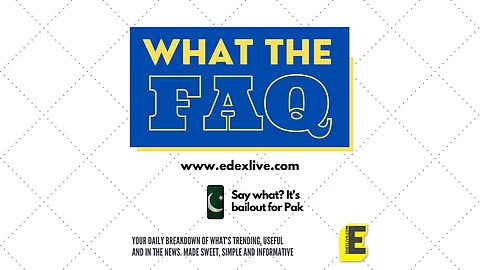

A week ago, it was reported that Pakistan is receiving a stalled bailout package of USD 8 billion from the International Monetary Fund (IMF) and, on May 1, the news that Saudi Arabia has agreed to help Pakistan with a bailout package of the same amount was reported. What does this mean? Simply put, Pakistan has become a cash-strapped country in urgent need of aid. How did this happen and how can a bailout save the situation? Let us dive into the details and find out in this edition of #WhatTheFAQ.
First of all, what is a bailout?
A bailout is defined in the Cambridge English Dictionary as “a loan or other financial support that is given to a person, company or country to help them when they are in financial difficulties”. The term has a maritime origin and describes the act of removing water from a sinking vessel using a bucket. It is commonly used when government resources are used to support a failing economy, especially to prevent a greater problem or financial contagion to other parts of the economy. A bailout may or may not involve an insolvency process.
Why does Pakistan need a bailout?
The country has faced increasing economic challenges with high inflation, sliding forex reserves, a widening current account deficit and a depreciating currency. The situation has worsened so much that earlier in April, Pakistan had cut the electricity supply to households and industries as it could no longer afford to buy coal or natural gas from overseas for its power plants, as the cost of fuel rose because of the Russia-Ukraine crisis. The cash-crisis in Pakistan had been continuing from the time of ousted Prime Minister Imran Khan. As such, a bailout is a method that can provide some relief to the country. It has been stated that Pakistan requires a financial assistance of USD 9-12 billion till June 2022 to avert further depletion of foreign currency reserves.
Why the IMF and Saudi Arabia?
A bailout package of USD 6 billion from the IMF had been stalled during the years of rule by PM Imran Khan. The end period of this package is September 2022. After the government was headed by the new PM Shehbaz Sharif, it was decided that the programme would be extended by nine months to one year and an addition of USD 2 billion would be made. An understanding was reached after talks between Pakistan's newly-appointed Finance Minister Miftah Ismail and IMF Deputy Managing Director Antoinette Sayeh in Washington. And during PM Sharif’s recent visit to Saudi Arabia, a deal was secured according to which the country will provide Islamabad with a financial support package of around USD 8 billion.
How will the money be provided?
The financial package from Saudi Arabia will include doubling of the oil financing facility, providing additional money either through deposits or Sukuks (Arabic name for financial certificates, similar to a bond in Western finance, that complies with Islamic religious law commonly known as Sharia) and rolling over of the existing USD 4.2 billion facilities. The technicalities are being worked out, and it will take weeks for them to be finalised, it has been reported.
As for the financial assistance from the IMF, the official statement on the development is yet to be released. The Pakistan government will also have to demonstrate that it would undo some wrong steps taken by the former regime against the commitments that it gave to the IMF Board in January this year.
How will this help Pakistan?
In a media report, it has been stated that this financial package is aimed at helping Pakistan to bolster dwindling forex reserves and revive its ailing economy. And as Pakistan is currently passing through a phase of political and economic uncertainty, the decision to stay in the IMF program for longer than the original period would bring clarity in economic policies and soothe the rattling markets.
